年龄因素对第二语言习得的影响论文
关于年龄对于第二语言学习和教学的影响
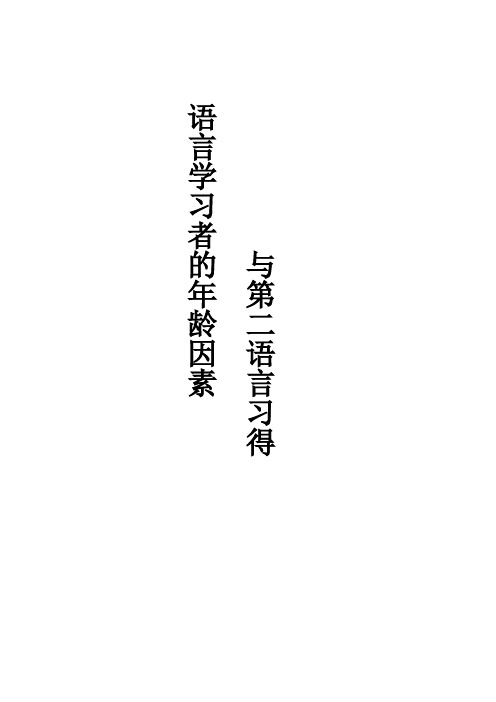
语言学习者的年龄因素与第二语言习得人的大脑发育程度,认知能力水平及情感因素等的不同是年龄影响第二语言习得的三组主要原因。
年龄因素与二语习得,即语音习得、语法习得、词法、名法习得以及习得者会话熟练程度有着密切的关系。
研究年龄对第二语言习得的影响,在第二语言教学中具有一定的指导意义。
多数人认为:在第二语言习得过程中,年龄小的人比年龄大的人学得好;儿童比成年人学得好。
那么,年龄小的人总比年龄大的人学得好吗?在青春期后才开始第二语言学习的人(包括成年人)能否获得该语言的母语习说者的语言能力?通过对大量的有关年龄因素如何影响“第二语言习得”的资料的辩证分析,就语音和语法方面而言,年龄小的学习者具有优势,但在读写和语法方面成年人却占有优势。
因此,我们不难得出结论:年龄小的人并非总是比年龄大的人学得好。
下面我们将论述一下年龄因素影响第二语言习得的主要依据1﹒大脑发育对第二语言习得的影响和语言习得关键期假说及其理论基础。
儿童、青少年与成年人在大脑发育方面的差异不外乎是大脑发育的成熟程度。
研究表明,人的大脑两侧随着发育的逐渐成熟分别被赋予”不同的功能“——这便是脑半球侧化现象。
人类语言智力的、逻辑的、分析的功能逐步被侧化到左半球,而情感的社会功能则渐渐被侧化到右半球。
这也是伦尼伯格证实关键期假说的生理基础所在。
在语言习得过程中,有一个关键期,在这一关键期内,大脑灵活性强,语言学习可以自然发生,而且很容易;一旦过了这段时期,想要成功地学会一门语言是不可能的。
这就是备受语言学界关注的“关键期假说”。
按照关键期假说,人的一生中有一段时期(出生至12岁)可以自然地、毫不费力地习得语言。
虽然对“关键期假说”理论至今仍争论不休,因此对年龄因素如何影响语言习得至今无法达成共识。
但是大多数的研究者认为:在外语习得过程中,年龄小的比年龄大的学得好,儿童比成人学的好,低龄儿童比大龄儿童学得好。
第二语言习得者的起始年龄对语音的准确性起到了决定性作用。
2021年龄对第二语言习得的影响与外语教学启发范文1
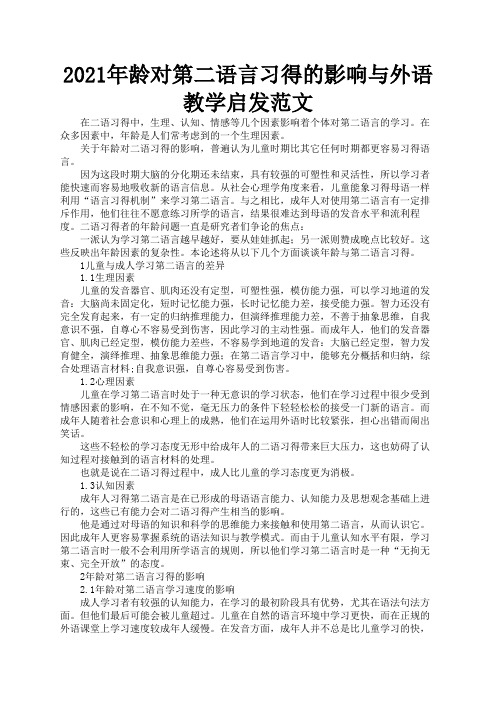
2021年龄对第二语言习得的影响与外语教学启发范文 在二语习得中,生理、认知、情感等几个因素影响着个体对第二语言的学习。
在众多因素中,年龄是人们常考虑到的一个生理因素。
关于年龄对二语习得的影响,普遍认为儿童时期比其它任何时期都更容易习得语言。
因为这段时期大脑的分化期还未结束,具有较强的可塑性和灵活性,所以学习者能快速而容易地吸收新的语言信息。
从社会心理学角度来看,儿童能象习得母语一样利用“语言习得机制”来学习第二语言。
与之相比,成年人对使用第二语言有一定排斥作用,他们往往不愿意练习所学的语言,结果很难达到母语的发音水平和流利程度。
二语习得者的年龄问题一直是研究者们争论的焦点: 一派认为学习第二语言越早越好,要从娃娃抓起;另一派则赞成晚点比较好。
这些反映出年龄因素的复杂性。
本论述将从以下几个方面谈谈年龄与第二语言习得。
1儿童与成人学习第二语言的差异 1.1生理因素 儿童的发音器官、肌肉还没有定型,可塑性强,模仿能力强,可以学习地道的发音:大脑尚未固定化,短时记忆能力强,长时记忆能力差,接受能力强。
智力还没有完全发育起来,有一定的归纳推理能力,但演绎推理能力差,不善于抽象思维,自我意识不强,自尊心不容易受到伤害,因此学习的主动性强。
而成年人,他们的发音器官、肌肉已经定型,模仿能力差些,不容易学到地道的发音:大脑已经定型,智力发育健全,演绎推理、抽象思维能力强;在第二语言学习中,能够充分概括和归纳,综合处理语言材料;自我意识强,自尊心容易受到伤害。
1.2心理因素 儿童在学习第二语言时处于一种无意识的学习状态,他们在学习过程中很少受到情感因素的影响,在不知不觉,毫无压力的条件下轻轻松松的接受一门新的语言。
而成年人随着社会意识和心理上的成熟,他们在运用外语时比较紧张,担心出错而闹出笑话。
这些不轻松的学习态度无形中给成年人的二语习得带来巨大压力,这也妨碍了认知过程对接触到的语言材料的处理。
也就是说在二语习得过程中,成人比儿童的学习态度更为消极。
年龄与二语习得
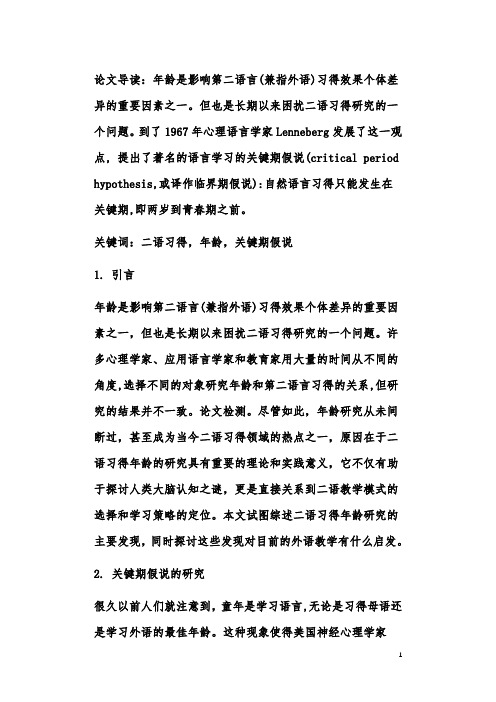
论文导读:年龄是影响第二语言(兼指外语)习得效果个体差异的重要因素之一。
但也是长期以来困扰二语习得研究的一个问题。
到了1967年心理语言学家Lenneberg发展了这一观点, 提出了著名的语言学习的关键期假说(critical period hypothesis,或译作临界期假说):自然语言习得只能发生在关键期,即两岁到青春期之前。
关键词:二语习得,年龄,关键期假说1. 引言年龄是影响第二语言(兼指外语)习得效果个体差异的重要因素之一,但也是长期以来困扰二语习得研究的一个问题。
许多心理学家、应用语言学家和教育家用大量的时间从不同的角度,选择不同的对象研究年龄和第二语言习得的关系,但研究的结果并不一致。
论文检测。
尽管如此,年龄研究从未间断过,甚至成为当今二语习得领域的热点之一,原因在于二语习得年龄的研究具有重要的理论和实践意义,它不仅有助于探讨人类大脑认知之谜,更是直接关系到二语教学模式的选择和学习策略的定位。
本文试图综述二语习得年龄研究的主要发现,同时探讨这些发现对目前的外语教学有什么启发。
2. 关键期假说的研究很久以前人们就注意到,童年是学习语言,无论是习得母语还是学习外语的最佳年龄。
这种现象使得美国神经心理学家Penfield 于1959年提出“白板理论”,认为在婴儿出生时大脑皮层的某些区域具有固定的功能,但有一块皮层最后将用于语言和感觉,在早期可以运用这片空白区域进行语言学习,几种语言可以轻易地被同时习得,认为4-8岁是学习外语的最佳起始年龄。
到了1967年心理语言学家Lenneberg发展了这一观点, 提出了著名的语言学习的关键期假说(critical period hypothesis,或译作临界期假说):自然语言习得只能发生在关键期,即两岁到青春期之前。
关键期假说在二语习得领域引发了无数研究和争论,支持和反对的论据都有。
20 世纪 60年代末 70 年代初,这场激烈争论的焦点是围绕儿童学习外语是否比成人存在优势。
年龄和情感因素对二语习得影响论文
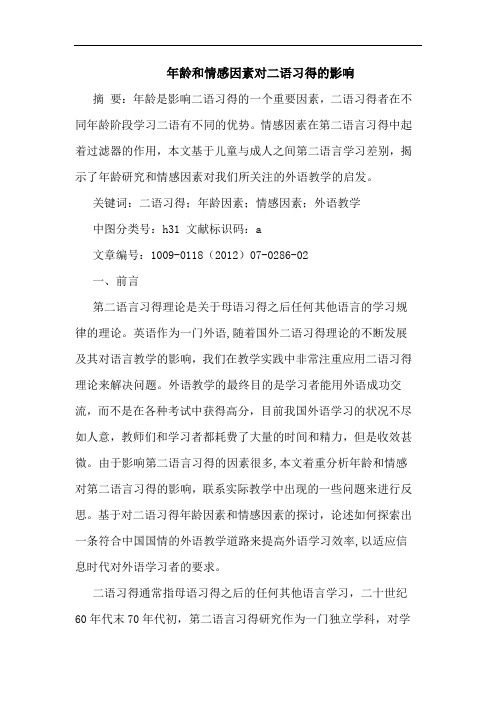
年龄和情感因素对二语习得的影响摘要:年龄是影响二语习得的一个重要因素,二语习得者在不同年龄阶段学习二语有不同的优势。
情感因素在第二语言习得中起着过滤器的作用,本文基于儿童与成人之间第二语言学习差别,揭示了年龄研究和情感因素对我们所关注的外语教学的启发。
关键词:二语习得;年龄因素;情感因素;外语教学中图分类号:h31 文献标识码:a文章编号:1009-0118(2012)07-0286-02一、前言第二语言习得理论是关于母语习得之后任何其他语言的学习规律的理论。
英语作为一门外语,随着国外二语习得理论的不断发展及其对语言教学的影响,我们在教学实践中非常注重应用二语习得理论来解决问题。
外语教学的最终目的是学习者能用外语成功交流,而不是在各种考试中获得高分,目前我国外语学习的状况不尽如人意,教师们和学习者都耗费了大量的时间和精力,但是收效甚微。
由于影响第二语言习得的因素很多,本文着重分析年龄和情感对第二语言习得的影响,联系实际教学中出现的一些问题来进行反思。
基于对二语习得年龄因素和情感因素的探讨,论述如何探索出一条符合中国国情的外语教学道路来提高外语学习效率,以适应信息时代对外语学习者的要求。
二语习得通常指母语习得之后的任何其他语言学习,二十世纪60年代末70年代初,第二语言习得研究作为一门独立学科,对学习者的第二语言特征及其发展变化、学习者学习第二外语时所具有的共同特征和个别差异进行描写,并分析影响二语习得的内、外部因素。
在学习第二外语的时候,学习者不可避免地受到内在和外在因素的影响,母语、年龄、语言环境和个人的生理和心理特征等都是影响二语习得的因素,本文着重就年龄因素和情感因素进行探讨,并运用它解决我们在日常教学中碰到的实际问题。
二、年龄因素(一)不同年龄的语言学习者有不同的优势1、儿童在二语习得中的优势在自然语言环境里,儿童学母语既快而容易,即使学外语,似乎也比成人容易许多,儿童学习语言既快又好,靠的是与生俱来的普遍语法。
年龄对第二语言习得的影响
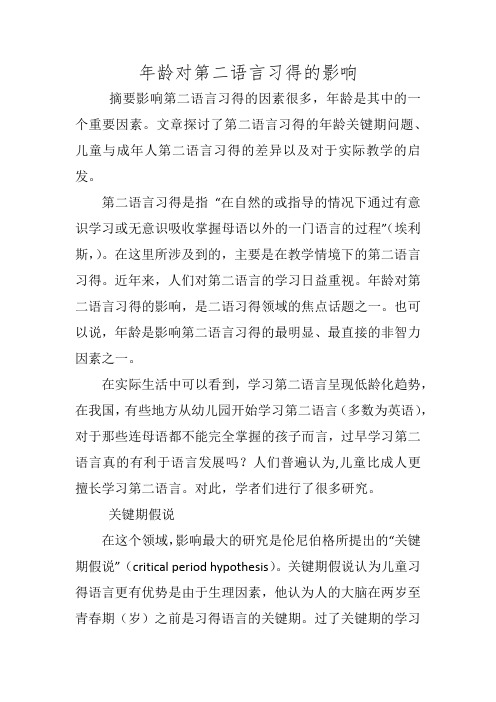
年龄对第二语言习得的影响摘要影响第二语言习得的因素很多,年龄是其中的一个重要因素。
文章探讨了第二语言习得的年龄关键期问题、儿童与成年人第二语言习得的差异以及对于实际教学的启发。
第二语言习得是指“在自然的或指导的情况下通过有意识学习或无意识吸收掌握母语以外的一门语言的过程”(埃利斯,)。
在这里所涉及到的,主要是在教学情境下的第二语言习得。
近年来,人们对第二语言的学习日益重视。
年龄对第二语言习得的影响,是二语习得领域的焦点话题之一。
也可以说,年龄是影响第二语言习得的最明显、最直接的非智力因素之一。
在实际生活中可以看到,学习第二语言呈现低龄化趋势,在我国,有些地方从幼儿园开始学习第二语言(多数为英语),对于那些连母语都不能完全掌握的孩子而言,过早学习第二语言真的有利于语言发展吗?人们普遍认为,儿童比成人更擅长学习第二语言。
对此,学者们进行了很多研究。
关键期假说在这个领域,影响最大的研究是伦尼伯格所提出的“关键期假说”(critical period hypothesis)。
关键期假说认为儿童习得语言更有优势是由于生理因素,他认为人的大脑在两岁至青春期(岁)之前是习得语言的关键期。
过了关键期的学习者不会像在关键期内的学习者一样成功,而且很容易产生外国腔。
这是因为,青春期以前,大脑的两个半球都参与了语言学习,大脑可塑性较强,语言习得较快,也较为成功;而在青春期后,大脑发生了侧化,逐渐失去可塑性,语言学习也就越来越困难。
关键期的相关研究关键期这一假说,是针对母语习得提出的,并且已经得到了广泛的认可。
但是对于关键期在二语习得中的作用,学者们看法不一。
反对关键期假说的学者提出非生物基础的解释,认为语言输入和认知发展等社会心理因素是导致习得水平出现差异的主要决定因素。
赞成关键期理论的学者则以实证研究为依据,坚信关键期假设在相当一段时间内不可能被推翻。
二语习得领域里, 支持关键期存在最具代表性的研究是johnson和newport ()的实验。
年龄与第二语言习得

年龄与第二语言习得第二语言习得是指一个人在掌握母语之后,学习一种新的语言的过程。
年龄是一个重要的因素,影响着一个人学习第二语言的能力。
在过去的研究中,年龄被认为是一个决定性的因素,影响着第二语言习得的成果。
然而,近年来的研究表明,尽管年龄确实会对第二语言习得产生一些影响,但并非完全决定性的因素。
本文将探讨之间的关系,并讨论不同年龄段的人在习得第二语言方面的优势和挑战。
首先,幼儿期被认为是最佳的第二语言习得时期。
在幼儿期,大脑处于发育的高峰时期,语言的习得能力较强。
研究表明,幼儿在学习第二语言时更具有听觉和发音的优势,他们能够轻松地模仿和掌握新的语音和语调。
此外,幼儿在语言习得过程中更加自然,不会受到母语的干扰,更容易形成正确的语言结构和习惯用法。
因此,幼儿在学习第二语言方面往往进展迅速,并且能够获得更地道的语言表达。
然而,成年人也具有他们自己的优势和挑战。
成年人在学习第二语言时更有条理和系统,能够更好地利用已有的语言知识和学习策略。
他们有丰富的生活经验和学习经验,可以将新的语言知识与已有的知识联系起来,提高学习效果。
此外,成年人在语言学习方面更有意识和自我评估的能力,能够更有效地规划和调整学习策略。
然而,成年人的习得过程也面临着一些挑战。
比如,成年人可能受到母语的干扰,会在语音、语法和词汇等方面存在一定的偏差。
此外,成年人在语言习得方面需要更多的时间和精力,需要具备更强的毅力和耐心。
除了幼儿期和成年期,青少年也是一个重要的第二语言习得时期。
在青少年期,大脑依然处于发育的阶段,语言习得能力也相对较强。
青少年在学习第二语言时,可以充分利用他们的认知和分析能力,能够更深入地理解语言规则和结构。
同时,青少年也拥有更强的社交意识和交际能力,能够更好地参与语言互动和实践,提高语言运用的流利度和综合能力。
然而,青少年在习得第二语言方面也面临一些挑战。
他们可能会受到学校课业和社交活动的压力影响,导致学习时间和精力的分散。
关于年龄对于第二语言学习和教学的影响
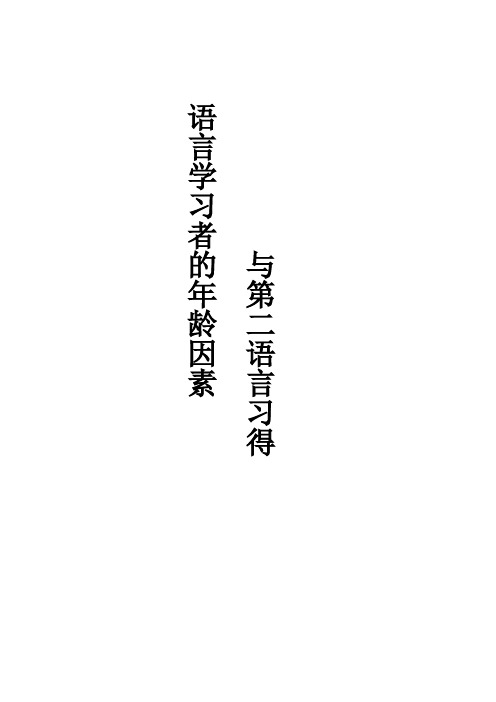
语言学习者的年龄因素与第二语言习得人的大脑发育程度,认知能力水平及情感因素等的不同是年龄影响第二语言习得的三组主要原因。
年龄因素与二语习得,即语音习得、语法习得、词法、名法习得以及习得者会话熟练程度有着密切的关系。
研究年龄对第二语言习得的影响,在第二语言教学中具有一定的指导意义。
多数人认为:在第二语言习得过程中,年龄小的人比年龄大的人学得好;儿童比成年人学得好。
那么,年龄小的人总比年龄大的人学得好吗?在青春期后才开始第二语言学习的人(包括成年人)能否获得该语言的母语习说者的语言能力?通过对大量的有关年龄因素如何影响“第二语言习得”的资料的辩证分析,就语音和语法方面而言,年龄小的学习者具有优势,但在读写和语法方面成年人却占有优势。
因此,我们不难得出结论:年龄小的人并非总是比年龄大的人学得好。
下面我们将论述一下年龄因素影响第二语言习得的主要依据1﹒大脑发育对第二语言习得的影响和语言习得关键期假说及其理论基础。
儿童、青少年与成年人在大脑发育方面的差异不外乎是大脑发育的成熟程度。
研究表明,人的大脑两侧随着发育的逐渐成熟分别被赋予”不同的功能“——这便是脑半球侧化现象。
人类语言智力的、逻辑的、分析的功能逐步被侧化到左半球,而情感的社会功能则渐渐被侧化到右半球。
这也是伦尼伯格证实关键期假说的生理基础所在。
在语言习得过程中,有一个关键期,在这一关键期内,大脑灵活性强,语言学习可以自然发生,而且很容易;一旦过了这段时期,想要成功地学会一门语言是不可能的。
这就是备受语言学界关注的“关键期假说”。
按照关键期假说,人的一生中有一段时期(出生至12岁)可以自然地、毫不费力地习得语言。
虽然对“关键期假说”理论至今仍争论不休,因此对年龄因素如何影响语言习得至今无法达成共识。
但是大多数的研究者认为:在外语习得过程中,年龄小的比年龄大的学得好,儿童比成人学的好,低龄儿童比大龄儿童学得好。
第二语言习得者的起始年龄对语音的准确性起到了决定性作用。
浅谈年龄对学习者第二语言习得最终水平的影响
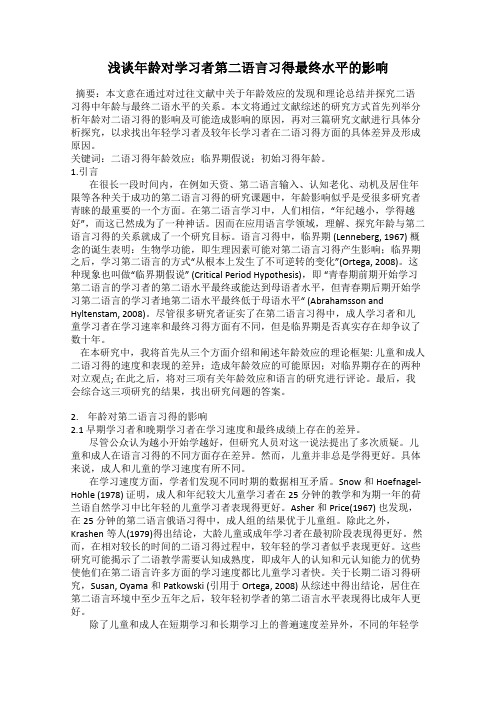
浅谈年龄对学习者第二语言习得最终水平的影响摘要:本文意在通过对过往文献中关于年龄效应的发现和理论总结并探究二语习得中年龄与最终二语水平的关系。
本文将通过文献综述的研究方式首先列举分析年龄对二语习得的影响及可能造成影响的原因,再对三篇研究文献进行具体分析探究,以求找出年轻学习者及较年长学习者在二语习得方面的具体差异及形成原因。
关键词:二语习得年龄效应;临界期假说;初始习得年龄。
1.引言在很长一段时间内,在例如天资、第二语言输入、认知老化、动机及居住年限等各种关于成功的第二语言习得的研究课题中,年龄影响似乎是受很多研究者青睐的最重要的一个方面。
在第二语言学习中,人们相信,“年纪越小,学得越好”,而这已然成为了一种神话。
因而在应用语言学领域,理解、探究年龄与第二语言习得的关系就成了一个研究目标。
语言习得中,临界期 (Lenneberg, 1967) 概念的诞生表明:生物学功能,即生理因素可能对第二语言习得产生影响;临界期之后,学习第二语言的方式“从根本上发生了不可逆转的变化”(Ortega, 2008)。
这种现象也叫做“临界期假说” (Critical Period Hypothesis),即“青春期前期开始学习第二语言的学习者的第二语水平最终或能达到母语者水平,但青春期后期开始学习第二语言的学习者地第二语水平最终低于母语水平“ (Abrahamsson and Hyltenstam, 2008)。
尽管很多研究者证实了在第二语言习得中,成人学习者和儿童学习者在学习速率和最终习得方面有不同,但是临界期是否真实存在却争议了数十年。
在本研究中,我将首先从三个方面介绍和阐述年龄效应的理论框架: 儿童和成人二语习得的速度和表现的差异;造成年龄效应的可能原因;对临界期存在的两种对立观点; 在此之后,将对三项有关年龄效应和语言的研究进行评论。
最后,我会综合这三项研究的结果,找出研究问题的答案。
2. 年龄对第二语言习得的影响2.1 早期学习者和晚期学习者在学习速度和最终成绩上存在的差异。
- 1、下载文档前请自行甄别文档内容的完整性,平台不提供额外的编辑、内容补充、找答案等附加服务。
- 2、"仅部分预览"的文档,不可在线预览部分如存在完整性等问题,可反馈申请退款(可完整预览的文档不适用该条件!)。
- 3、如文档侵犯您的权益,请联系客服反馈,我们会尽快为您处理(人工客服工作时间:9:00-18:30)。
Age Factor in Second Language Aquisition1. IntroductionNowerdays, with the development of society and technology, our society has become more open. People, with different colors,who come from different countries and areas communicate with each other in various ways and methods. Language, of course, is one of the most important tools in our communication. As we all known, English is an international language in the whole world. Accordingly, in our country, English learning is very popular with not only students, but also the children, adults and even the retired old man. And according to many studies,age is one of the most important individual factors affecting foreign language learning, which is considered as a focus of applied linguistics and psycholinguistics. Almost all parents think that"Don't let their own children lose at the beginning. "In China,all the families believe that it is very important for the students to learn English in the childhood.And many parents even send their children to language schools at an early age in older to get a high score.In recent years,some scholars in China such as Gui Shichun, Wang Chuming, Dai Manchun, Dai Weidong have a heated discussion about the affection of age factors in foreign language teaching and learning. At the same time, the government have also paid more attention on English learning. Nowerdays,many reseachers have studied the factors affecting language learning, such as intelligence, aptitude, personality, motivation, attitudes, earner's preference, learner's beliefs and age of acquisition. But I just want to study the influence of age factor. Is it good enough for parents to let their children learn English at an early age? Do children have absolute advantages over adolescents and adults in second language acquisition? What are the respective advantages and disadvantages of children,adolescents and adults? With the above problems analyzed,this thesis focus on the influence of age factor on the Second Language Acquisition.2. Second Language Acquisition2.1 Definitin of Second Language Acquisition"Second language acquisition"refers to the subconscious or conscious processes by which a language other than mother tongue is learnt in a natural or a tutored or a classroom; it covers the development of phonology,lexis,grammar, pragmatics and other knowledge(Hu Zhuanglin,p.268). How children acquire their native languages and what is the relavance of this to foreign language learning has long been debated. Although evidence for the declining of second language learning ability with age is controversial, a common assumption is that children learn second languageseasily and fluently compared with old learners. This assumption stems from"critical period"(CP) ideas(Lennerberg,1967). It is commonly know that children with regular faculties and given normal circumstances will easily master their native languages. Unfortunately,perfect language mastery is rarely in the process of second language acquisition. One of the most obvious potential explanations for the lack of success of second language learners compared to first language learners is that the acquisition of second language begins at a later age than that of the mother tongue does. Thus, many scholars assume that age itself is a predicator of second language proficiency.A popular belief in this area is that younger learners have certain advantages over older learners in foreign language learning and many linguists and researchers share this belief. They believe that younger children learn second language more easily and quickly than older children (Ellis,2008;Larsen-Freeman,2008). However,some other researchers hold the the opposite point. They believe that younger learners do not show any advantage over older learners in second language learning, and they even can provide some evidence to prove scientifically that the opposite is true, i.e. older learners exhibit some advantages over younger learners (Snow&Hoefnagef-Hohle,1978).About the study on age factors affecting second language acquisition,Carroll(1980) provided neurological basis for critical period hypothesis from aspect of earlier exposure, whose experiment indicates that the earlier exposure to second language,more or less, is of significance to the success of second language acquisition. That is, the early exposure to second language will bring quite different quality to later language learning in both natural and conscious settings.2.2 Current Situation of Second Language AcquisitionMany studies pay much attention to the age factor in second language learning at home and abroad. The relationship between age factor and second language acquisition has become more and more hot and popular.As for second languge acquisition. Penfield and Roberts(1959:130) first introduced the Critical Period. According to Penfield and Roberts, a child's brain is more plastic compared with that of an adult. And in 1967, Lenneberd introduced the Critical Period Hypothesis to second language acquisition, which could account for children's faster and more successful attainment over adults in second language acquisition.The research of age factor in foreign language learning also attracts much attention of the scholars in China.But it seems that many of them are on the opponent side. Professor Gui Shichun(1992:54-56) questioned the popular concept of "the younger, the better". Recently, in Guangdong Province, Professor Dong Y anping(2003:39-47) proposed that it was not necessary to start English teaching programs for young children in kindergartens and Grade 1 of primaryschools. At the same time, a variety of English learning phenomena have sprung up in China:in 2001, the Education Ministry decided that pupils begin English learning from Grade Three in cities and condition-permitting rural areas; in Shanghai all the pupils have been required to learn English from Grade One since 2003; English training courses for kids mushroom all over the country and at the same time, English textbooksand tapesforkids becomebest-sellers. English languagehas turnedintoa secondlanguage inChina.3. Factors Affeting Second Language AcquisitionIn our life and experience, almost all normal children can succeed in their first language acquisition on condition that they get a normal upbring. However, it is quite different in second language learning.Actually, different characteristics of learners will lead to different results in second language learning. And everyone has his own personality. In addition to personality, other factors are also relevant to language learning. These include intelligence, motivation, aptitude, learners 'preferences and learners' belief.3.1 IntelligenceThe level of learners' intelligence have an influence or second language learning. Over the past years, through using some intelligence tests or different methods, and then using the scores measure the intelligence of the learners. Researchers suppose that intelligence may be connected with second language ability. Recently, more and more studies have proved this. However, it is not the only factor. There are many students who are very successful in second language learning without high intelligence scores.3.2 PersonalityThere are many personality characteristics have been considered to be related to second language learning such as extroversion and inhibition. Many believed that extroversion is well suited to second language learning. However, this conclusion does not always get enough support. That is to say, in many studies, many learners who haven't got high scores on measuring extroversion are still successful in the second language learning.In terms of inhibition,it discourages the progress in language learning because the learners' courage of taking risk can be reduced by the inhibition personality. In fact, personality characteristics still conclude others such as empathy, talkativeness, self-esteem, dominance and responsiveness. However, the clear relationship between learners' personality and second language learning hasn't been found out because it is complicated. As an English teacher,we prefer the active and lively students in the class since they have good performance. So this kind of students who can get more attention from the teachers often has more opportunities to practiceand express.3.3 AptitudeAptitude can be considered as a kind of talent which is made up of different kinds of abilities. The followings are some examples:(1) The ability to recognize the meaning of the words in the sentences.(2) The ability to remember new words. This kind of ability is much more concerned with the learners' vocabulary ability.(3) The ability to analyze the grammar of the material. There are many grammatical rules. So the ability of analyzing the grammar can affect the learners' language learning.(4) The ability to translate. Translation is very important in language learning and using. Any students who has a good knowledge of translation can do a better job in reading, speaking and even writing.3.4 MotivationThrough the studies of second language acquisition, the learners' attitude and motivation also plays an important role in learning a second language. And the good and positive attitude and motivation will be more likely to succeed in second language learning than the opposite. Motivation can be studied in two main parts: learners' communicative needs and their attitudes towards the second language community.Therefore, if the learner wants to use the second language efficiently, they must have an abtive attitude and master opportunities to practice. Besides, the personal growth,cultural enrichment and instrumental motivation are all concluded in motivation, which are also concerned with the success of the second language learning.However, the researchers cannot find out how the motivation affects on the learners during their second language learning.3.5 Learners’ PreferenceAs for the learning material and learning methods, every learner has his own preference. Some learners say that they cannot learn something before they have seen it, while others seem to know something as long as they talked it once or twice.When learners show his preference for some materials or topics which we disagree with the learning method, we should encourage the learners to use their available ways to achieve the success rather than stop them.3.6 Learners’ BeliefAlthough not all the language learners may have their individual consciousness of the language learning, all of them have their strong beliefs which influence their learning methods.Therefore, the learners' belief is also an important factor in second language learning.4. Age Factors and Second Language Aquisition4.1 The Affects of Age Factors4.1.1 The Affects of Age Factors on Rate of Second Language AcquisitionOne popular belief about second language acquisition is that the younger, the better. Recently, certain research reports claim to counter this early Critical Period Hypothesis and state that age and language acquisition is inconsistent. Not all younger performs to be superior.Opposite to the Critical Period Hypothesis, Krashen, Long and Scarcella(1979) draw a different conclusion: (1)adults are superior to children in rate of acquisition, and(2)older children learn more rapidly than younger children(Krashen, et al, 1979). This results reflect differences in rate of acquisition which are consistent with the hypothesis. Adults are generally faster than children in early stages of second language acquisition.In1967, J.Asher and S.Price compared the ability of listening comprehension of 8-10-year-old and 14-year-old childrent and college adults. The results show that adults score highest while the 8-year-old children were the lowest of all groups tested.T10-year-old and 14-year-old children were between adults are the 8-year-olds. This study suggests that the adults ard superior to the same conditions as children when they learn a second language.Ervin-Tripp(1974) studied the rate of acquisition of French by 31 English-speaking children aged from four to who learn French nine month in Switzerland(including attendance in French-speaking schools). She reached the conclusion that children performed much better.Burstall et al.(1975) and Ekstrand(1977) researched majority children who learn a foreign language in Britain and Sweden respectively. Burstall et al.make a study about a large number of school students,some of whom began learning French at the age of eight and others who began at the age eleven after three years on condition having learnt French for the same amount of time, the older learners were ahead on three out of four skills tested-listening, reading and writing.The younger learners, however, mastered speaking ability highly.Snow and Hoefnagel-hohle(1978) make a study who learn Dutch in Holland. The subjects were divided into five age groups: ten3-to-5-year-olds, eight6-to-7-year-olds, thirteen8-to-10-year-olders, nine12-to-15-year-olds, and eleven adults. The study indicated that 3-to-5-year-olds scored lowest and the 12-to-15-year-olds showed the most rapid acquisition of all the skills tested.Ekstrand(1978) makes a survey about four groups of Swedish school children, whose ages are 8, 9, 10 and 11 respectively. They had been taught English in 10-minute sessions twice a week after 18 weeks, the groups were tested for pronunciation(a taped imitation task) and comprehension(a taped imitation task) increases almost linearly with age.Ann Fathman made a study in 1982 which examined the relationship between certain aspects of the second language acquisition process and age through an oral production test.It examined about 200 children(aged 6 to 15) from diverse language backgrounds who were learning English as a second language in public schools. The results indicated that the older children performed better in the production of correct morphological and syntactic structures while the younger children performed better in the use of correct English pronunciation.From the following studies, we can conclude that age can affect the rate of second language learning. Adolescents and adults have many advantages in second language acquisitio n like faster speed and strong ability to acquire syntax and morphology while children perform much better in phonology.4.1.2 The Affects of Age Factors on the Process of Second Language AcquisitionFew people make a study of the effects of age on the process of second language acquisition. By far Harley's(1986) investigation of early and late immersion programmes is the most detailed study of the effects of age on the acquisition process. Harley made a comprison between the two groups' acquisition of French verb phrase. For example, the two groups generally made similar types of errors and both groups prefer the relatively unmarked French verb forms to the marked forms. There were only a few differences reflected variations in the second language input to which the learners were exposed.Bailey et al.(1974) investigated the order in which adults acquired the same set of grammatical morphemes studied by Dulay and Burt who found an order similar to that found in the morpheme studies of children. Fathman(1975) found that the order of acquisition remained constant compared with her sample of two hundred children aged from 6 to 15 years.Cazden et al.(1975) found that child, adolescent, and adult learners went through the same stages. Thus, learners appear to process linguistic data in the same way, no matter how old they are.According to their study, the process did not remain constant for children who were in different ages as for order of acquisition. Despite of differences of age and learning environments, there seemed to be a consistency in the order. These findings also support the ideas of Dulay and Burt(1973) and Madden, Bailey, and Krashen(1974), which suggest that there appeared to be similar in terms of acquisition of structures for all second language learners.4.1.3The Affects of Age Factors on Learners’ Second Language AchievementMany researchers have compared older and younger children and concluded that older children are faster learners of syntax and morphology. Then comes the question, whether learners who begin learning can reach higher levels of second language ability than those who start as adolescents or adults. To answer this question,some scholars did some researches.Burstal et al.(1974), through comprison, found the result that those who started learning French in school at either age 8 or 11when reached age 16. There was only one test result in favor of the early learners, that is to say, only listening comprehension better.In another study, Dunkel&Pillet(1962), through the comprison of American Schook children who had begun learning French at grade 3 and students of the same age who had had only one year of French at the secondary level, found that the former did not do as well as the latter in terms of the standardized group test of formal grammar in Franch.Oller&Nagato(1974) found the same results in school system in Japan. Students learn English as a second language from grades 1-6did not do better than students who began learning English in grade 7 when they attend test in the grade 11.Harley(1986) also make a research which focused on learners' acquisition of the French verb system. She compared early and late immersion students after both had received1,000hours of instruction. Neither group had mastered the verb system, but the older students can master well. However, the early immersion group showed higher levels of attainment than the late.The results from these reflect that children's level of attainment is greater than that of adolescents/adults. As Stern has emphasized, early age school instruction does not in itself guarantee success(Stern, 1976; Stern&Weinrib, 1977; Stern, 1982).4.2 Respective Advantages and Disadvantages among Different AgesWhen children, adolescents and adults learn a second language, they have neurological(Lenneberg, 1967), cognitive(Talor, 1974: 33) and social-psychological(Brown, H.D. 1987: 51; Talor, 1974) differences. There are many factors determining the differences between children and adults in second language learning such as learning learning environment, intelligence and difficulty in comparative researches and experiments, but age factor is the most influenced one. Actually, children, adolescents and adults have their own advantages and disadvantages in second language learning. The most practical way is to study the effects that age differences bring to language learning and the advantages and disadvantages that each each language learner at different age has in learning a foreign language.4.2.1 ChidhoodChildren's brains are flexible and may have an advantage to accept new knowledge in the second language learning. Therefore, it is easy for them to acquire pronunciation in this period. And a second language can be left a deep impression on the brains in this period. So this is very useful for children's further learning. For instance, some children's toys which can speak some English and Chinese words for them, and gradually, we can find those two years child speak the same words correctly. However, during this period, the parents just want to entertain the children. But they will remember those even when they grow up. At the same time, children havepoor-term and systematic memory, and usually confuse native and foreign languages or native culture and foreign culture, possessing poor ability of abstract thinking. Therefore, it is good for children to learn foreign languages in such bilingual social environment or better teaching facilities.Besides, our children don't have ability to judge what is right or what is wrong. Children generally follow others' words and actions. So it is not surprise to find that many children share the same behavior of siphoning off the fingers. Therefore, teachers and parents pay attention to children's environment because children can behave differently in different environments. So the teachers and parents should give proper guide in time when children make some mistakes. Some studies state that non-English-speaking have English lessons and instruction. But the length of the program is inconsistent with the acquisition speed. One of the most important factor is the influence of mother tongue. Therefore, it is not the best for children to learn a second language early.4.2.2 AdolescentsAdolescents have several advantages. They have a high cognitive maturity and a high ability of imitation and memory. Adolescents can also make the most of communicative strategies and understand language and culture very well, which make language input enriched. And they like joining the communication activities. Adolescents can grasp the language regulations and make full use of them in their sentences to express their deeper thoughts. Besides, they can also correct the errors in sentences. All these are obvious advantages for the adolescents in second language learning. For instance, if we ask adolescent students to do a role-play after learning a dialogue, most students can finish the task and some good students can even play it lively. While, if we ask children to do the same case, the children can hardly finish it. That is to say, only adults can achieve such advantages. And as we all known, the adolescents is a period of full of energy and imagination, thus the adolescents must have strong self-control ability and stick to their aims. Besides, they always consider themselves as adults. Therefore, they hate to be ignored and hope to win respect like adults, which is difficult for teacher to deal with. This why a successful teacher always treat some students as a adult while doing as a child.At the same time,adolescents have many courses in school. Nowadays,more adolescents learnt more than one kind of foreign language. They have to deal with many subjects. Many students even busy on the weekend.It seems that they have no time to relax. They always feel nervous. This make the students feel much burden. Thus, it is crucial for teachers and parents to give the adolescents proper guide when they grow the sense of giving up learni ng.4.2.3 AdulthoodAs we all known, adults mental is mature. They always have clear goals and strongmotivation to learn a second language. When they decide to learn a language, they will devote much energy to learning.Adults can grasp the complicated grammar and reading task better than adolescents and children. Therefore, they can understand the second language deeply. All those features lead to adults' learning well. At the same time, the following three kind of adults also have an advantage over adolescents and child.(1) Some adults work under an International environment, and this atmosphere may provide them more opportunities to practice foreign languages.(2) Some adults have a long-term or short-term plan to go abroad for further education or working. This plan may make them aware of strengthening their foreign language. And in order to realize this dream, they have to pay more energy and attention to foreign language learning. Therefore, they can promote their foreign language quickly.(3) Some students still have a strong conscious of learning. Thus they will further the quality of their already language. And they'll grasp every opportunity to improve their foreign language.Adults also have some disadvantages. For example, most adults have already worked after graduation,join in the social activities and care about the family day and night. Besides, many adults' memory isn't as good as before with the growth of age. Therefore, it is difficult for adults to master foreign language well. And the adults only practice English in the spare time such as when they are at home. They even can't focus their intention on practice if they have a baby. Thus, most adults try their best to make up those disadvantages.5. ConclusionIt is clear that age is an important factor in second language acquisition. It is not nessessary for students to learn a second language early. Y ounger learners are not necessarily better learners. Children, adolescents and adults have their own characteristics in second language learning. Children can easily grasp the pronunciation. Adolescents can understand language and culture better.It is good for second language learning. Adults can master the complicated grammar and language regularities. Thus, teachers and parents should employ different strategies in terms of learners of different ages.Bibliography[1] 林崇德.英语教学心理学[M]. 北京教育出版社, 2001,3[2] 刘建华.中学英语创新教法[M]. 学苑出版社, 1999,10[3] 束定芬、庄智象. 现代外语教学——理论、实践与方法[J].东北师大学报, 2006 (2)[4] 王立菲. 现代外语教学论[M]. 上海教育出版社, 2002,1[5] 王蔷. 英语教学法教程[M]. 高等教育出版社, 2005,4[6] 薛中梁. 谈英语课堂教学[M]. 湖北教育出版社, 2003,3[7] Liu Yongfa, Liu Xuan'en.The Practical Body Language[M]. Hua Wen Press, 1997,2[8] Wu Zongjie.Readings for Applied Linguistics and Language Teaching[J].Zhejiang Teachers' University,1998(3)。
